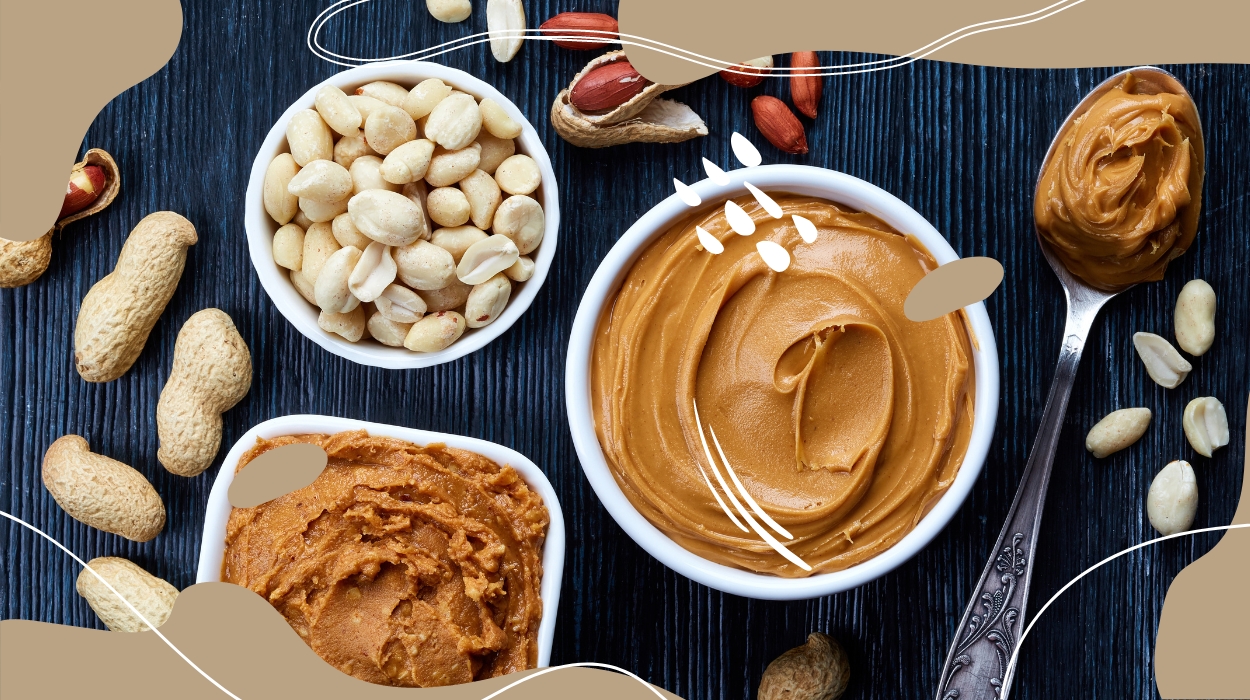 Expert's opinion
Expert's opinion
Expert's opinion
The article is a subjective view on this topic written by writers specializing in medical writing.
It may reflect on a personal journey surrounding struggles with an illness or medical condition, involve product comparisons, diet considerations, or other health-related opinions.
Although the view is entirely that of the writer, it is based on academic experiences and scientific research they have conducted; it is fact-checked by a team of degreed medical experts, and validated by sources attached to the article.
The numbers in parenthesis (1,2,3) will take you to clickable links to related scientific papers.
Are Peanuts Good For Weight Loss? Benefits And Risks 2024

Peanuts are a staple food in the American diet. According to the National Peanut Board, the average American consumed 7.9 pounds of peanuts in 2021. They are an economical, convenient, and nutrient-dense food. Although botanically classified as a legume, peanuts are often grouped with nuts from a dietary perspective. However, peanuts, like other nuts, are also high in calories.
While peanuts can be considered taboo on some weight loss diets, within the context of a balanced diet, they will likely not hurt your weight loss efforts and may even help. Nutrients in peanuts can help manage food cravings and improve satiety to naturally reduce overall calorie intake.
Are Peanuts Good For Weight Loss?
It may seem counterintuitive, but peanuts can be good for weight loss when consumed in the right amount. Overall energy intake should be balanced to achieve weight loss, but meta-analyses[1] of research have consistently determined no link between eating nuts, including peanuts, with weight gain, with many beneficial health effects.[2] Just because they are high fat, it should not be assumed peanuts are a fattening food.
Gradual weight gain is a natural part of aging, but both long-term observational and clinical research have confirmed that regular peanut and nut consumption is typically associated with a lower BMI[3] over time compared to non-nut consumers. Those who eat nuts and peanuts gain less weight overall and sometimes lose weight.
While peanuts are high in calories, people tend to adjust their overall calorie intake naturally when nuts are included in their diet, resulting in a net zero difference in overall energy consumption or potentially negative energy balance.
The fat content of peanuts is mostly monounsaturated fatty acids and polyunsaturated fatty acids rather than saturated fat, making peanuts a heart-healthy food. Raw peanuts are naturally low in sodium, but many processed peanut products have sodium added, which may decrease the heart health benefits.
Their dietary fiber and protein content are also impressive in such a small package. Peanuts are also rich in vitamins and minerals, particularly potassium, magnesium, calcium, and folate. The health benefits[4] clearly extend beyond weight loss as well.
Benefits Of Peanuts For Losing Weight
Based on the nutritional profile of peanuts, the mechanisms by which peanuts can encourage weight loss falls into three different etiologies.
Satiety

Effects on satiety and resulting dietary compensation are by far the most impactful attribute of peanuts regarding weight loss. Subjects regularly report increased satiety when they consume peanuts as part of a diet regimen. Fewer cravings and hunger pains make adherence to a healthy diet more attainable and lead to lower calorie intake,[5] resulting in weight loss.
This is likely due to peanuts’ naturally high protein and fiber content. Other mechanisms by which peanuts may have a high satiety value and offset calorie balance are also being investigated.
Glycemic Response
Some research indicates peanuts have a low glycemic index and therefore do not cause blood sugar spikes. This could result in decreased cravings and promote weight loss.[6] It can be especially effective[7] in maintaining stable blood sugar levels when eaten with other high glycemic index foods or high carbohydrate meals.
Energy Expenditure
Some evidence also suggests that consuming peanuts increases resting energy expenditure[8]–which means regular nut consumers naturally burn more calories.
It is hypothesized this may be partly due to the digestion of unsaturated fatty acids compared to saturated fat. The healthy unsaturated fats in peanuts are more likely to be burned for energy instead of stored as fat. Dietary protein also has a high thermic effect, meaning it requires more energy to break down and absorb protein.
More evidence is needed to confirm this finding consistently, but the nutrient profile of peanuts may be set up to enhance weight loss beyond helping to manage calorie intake.
Potential Risks

Allergies are the biggest risk or potential roadblock to enjoying the weight loss benefits of peanuts. Peanut allergies are one of the most common food allergies affecting roughly 2% of the population, according to a 2017 National Academy of Sciences report. There are some treatment options, but typically a peanut allergy requires strict avoidance of peanut products.
Peanuts have also been cited for aflatoxin risk and are the subject of several recent food-borne illness outbreaks.
Aflatoxins are a toxic byproduct of mold, and peanuts are particularly susceptible to microbiological growth during the initial processing phases. At the time of harvest, peanuts have a relatively high moisture content and must be dried for safe storage. Improper handling or drying of the peanuts may cause mold growth and the creation of aflatoxins.
However, the FDA[9] has compliance guidelines in place as part of the food industry’s food safety framework, and contamination is rare.
Similarly, peanuts and peanut products are susceptible to salmonella contamination,[10] which may occur during processing. Peanut butter is a particularly good environment for salmonella bacteria to linger for long periods of time. Widespread outbreaks have occurred as recently as May of 2022.[11]
Another very notable outbreak in 2009[12] infected over 700 individuals and caused 9 deaths due to contaminated peanut butter. While the risk is not large enough to avoid eating peanut butter by any means, consumers should be aware of current food safety recalls.
Finally, it should be noted that while research has clearly found the benefits of including peanuts as part of a healthy diet, eating more than 1-2 servings per day will likely be detrimental to your weight loss journey. Don’t overdo it, and include peanuts as part of a balanced diet.
Tips For Using Peanuts To Lose Weight
Peanuts are consumed in many different forms, and their nutritional value can vary slightly. Let’s take a quick look at the nutrient profile for common peanut products:
| Raw Peanuts[13] (1 oz, about ¼ cup) | Peanut Butter[14] (2 Tbsp) | Boiled Peanuts[15] (1 oz in shell, salted) | Peanut Flour[16], (defatted, 1 oz – about ¼ cup) | Peanut Oil[17] (1 Tbsp) | verify? | |
| Calories | 161 | 191 | 91 | 93 | 119 | |
| Total Fat | 14g | 16g | 6g | 0 | 13.5g | |
| Protein | 7g | 7g | 4g | 15g | 0g | |
| Total Carb | 4.5g | 7g | 6g | 10g | 0g | |
| Dietary Fiber | 2.4g | 1.5g | 2.5g | 4.5g | 0g | |
| Sodium | 5.1 mg | 137mg | 213mg | 51mg | 0g |
Not surprisingly, eating whole, roasted peanuts (preferably unsalted) is one of the best ways to get the protein, fat, and fiber trifecta of peanuts when it comes to weight management. A handful of peanuts is a healthy snack or added as a crunchy topping to a salad or even Asian-focused noodle dishes.
To note, the calories in boiled peanuts appear lower as they are traditionally served in the shell. Thus, the comparative portion size is smaller. Boiled peanuts are generally higher in sodium as a result of the traditional preparation method where salt is added, but are also a good choice for consuming peanuts.
Peanut flour or peanut powder is attractive as a lower-calorie and higher-protein peanut product. You may lose some of the heart health benefits as usually, it is partially or fully defatted. However, the nutrient profile may definitely be advantageous for certain weight loss regimes.
Peanut flour can be used as a wheat flour substitute in baking, as a tasty addition to a smoothie, or even reconstituted with liquid to make a spread.
Peanut butter is an economical way to get the benefits of peanuts but with a bit of sacrifice in the nutrient benefits. Additives are common in many peanut butter brands, so look for natural peanut butter that typically only has peanuts, salt, and possibly an oil ingredient as your best bet.
Peanut butter is an incredibly versatile food and is a delicious addition as a spread on whole grain bread, in smoothies, baked goods or snacks, savory sauces, and much more.
Peanut oil is not the best way to use peanuts for weight loss as the refinement process eliminates many of the essential nutrients delivered in a whole peanut product.
The Takeaway
Peanuts are a great addition to a healthy weight loss diet when consumed in the right size portion.
Heart-healthy fats, protein, and high fiber improve satiety and lead to lower calorie intake. It could be assumed that the high-fat nature of peanuts means they should be avoided, but research has shown eating peanuts does not cause weight gain and can help weight loss in some conditions.
Plus, there are some additional health benefits to including nuts like peanuts in your daily eating pattern.
So, go nuts (in moderation!) with your favorite peanut dishes or other snack foods if you’re looking to lose body weight.
+ 17 sources
Health Canal avoids using tertiary references. We have strict sourcing guidelines and rely on peer-reviewed studies, academic researches from medical associations and institutions. To ensure the accuracy of articles in Health Canal, you can read more about the editorial process here
- Martínez-Vizcaíno, V., Arthur Eumann Mesas, Garrido-Miguel, M., Martínez-Ortega, I.A., Jiménez-López, E. and Martínez-Vizcaíno, V. (2021). The Relationship of Tree Nuts and Peanuts with Adiposity Parameters: A Systematic Review and Network Meta-Analysis. [online] 13(7), pp.2251–2251. doi:https://doi.org/10.3390/nu13072251.
- Ros, E. (2010). Health Benefits of Nut Consumption. [online] 2(7), pp.652–682. doi:https://doi.org/10.3390/nu2070652.
- Casas-Agustench, P., Mònica Bulló, Ros, E., Basora, J. and Jordi Salas-Salvadó (2011). Cross-sectional association of nut intake with adiposity in a Mediterranean population. [online] 21(7), pp.518–525. doi:https://doi.org/10.1016/j.numecd.2009.11.010.
- Ros, E., Singh, A. and O’Keefe, J.H. (2021). Nuts: Natural Pleiotropic Nutraceuticals. [online] 13(9), pp.3269–3269. doi:https://doi.org/10.3390/nu13093269.
- Mattes, R.D., Kris-Etherton, P.M. and Foster, G.D. (2008). Impact of Peanuts and Tree Nuts on Body Weight and Healthy Weight Loss in Adults. [online] 138(9), pp.1741S1745S. doi:https://doi.org/10.1093/jn/138.9.1741s.
- Johnston, C.S. (2005). Strategies for Healthy Weight Loss: From Vitamin C to the Glycemic Response. [online] 24(3), pp.158–165. doi:https://doi.org/10.1080/07315724.2005.10719460.
- Cyril W.C. Kendall, Josse, A.R., Esfahani, A. and David J.A. Jenkins (2010). Nuts, metabolic syndrome and diabetes. [online] 104(4), pp.465–473. doi:https://doi.org/10.1017/s0007114510001546.
- Alper, C.A. and Mattes, R.D. (2002). Effects of chronic peanut consumption on energy balance and hedonics. [online] 26(8), pp.1129–1137. doi:https://doi.org/10.1038/sj.ijo.0802050.
- Compliance Policy Guide Sec. 570.375 Aflatoxins in Peanuts and Peanut Products: Guidance for FDA Staff. (n.d.). Available at: https://www.fda.gov/media/72073/download.
- Tapiwa Reward Sithole, Ma, Y., Qin, Z., Wang, X.Z. and Liu, H.-M. (2022). Peanut Butter Food Safety Concerns—Prevalence, Mitigation and Control of Salmonella spp., and Aflatoxins in Peanut Butter. [online] 11(13), pp.1874–1874. doi:https://doi.org/10.3390/foods11131874.
- Office (2022). 2022 Recalls of Food Products Associated with Jif Peanut Butter. [online] U.S. Food and Drug Administration. Available at: https://www.fda.gov/safety/major-product-recalls/2022-recalls-food-products-associated-peanut-butter-jm-smucker-company-due-potential-risk-salmonella.
- Anon, (2023). Investigation Information for Outbreak of Salmonella Typhimurium Infections, 2008–2009. [online] Available at: https://www.cdc.gov/Salmonella/2009/peanut-butter-2008-2009.html.
- Usda.gov. (2023). FoodData Central. [online] Available at: https://fdc.nal.usda.gov/fdc-app.html#/food-details/1100536/nutrients.
- Usda.gov. (2023). FoodData Central. [online] Available at: https://fdc.nal.usda.gov/fdc-app.html#/food-details/1100559/nutrients.
- Usda.gov. (2023). FoodData Central. [online] Available at: https://fdc.nal.usda.gov/fdc-app.html#/food-details/1100535/nutrients.
- Usda.gov. (2023). FoodData Central. [online] Available at: https://fdc.nal.usda.gov/fdc-app.html#/food-details/174267/nutrients.
- Usda.gov. (2023). FoodData Central. [online] Available at: https://fdc.nal.usda.gov/fdc-app.html#/food-details/171410/nutrients.



